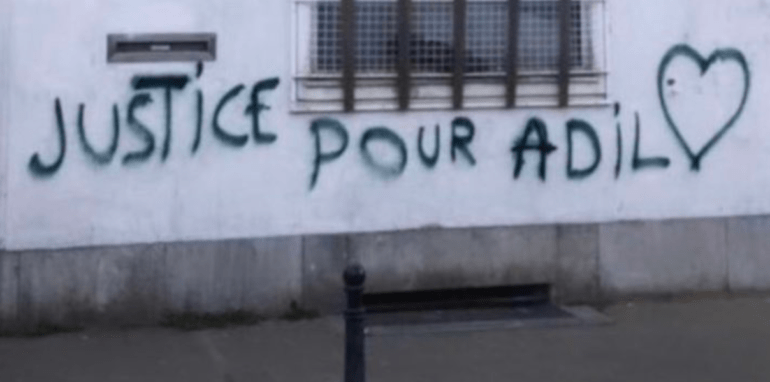
Riots in Brussels: on Corona “lockdown tiredness” and police racial bias
Author: Dr. An Van Raemdonck, ERC AdG PRIME Youth Researcher, European Institute, Istanbul Bilgi University; and Postdoctoral Researcher at the Department of Social and Cultural Anthropology, Vrije Universiteit Amsterdam, Amsterdam
A 19-year old resident of Anderlecht, Brussels, died on Friday night during a police chase. Adil, from Moroccan background, drove a moped together with a friend when they noticed a police patrol to enforce the mobility restrictions due to the Corona pandemic. The two youngsters fled from a police confrontation after which the patrolling officers chase them through the streets of Anderlecht and call for reinforcement from the Anti-Crime Brigade. While Adil bypasses a small van, he clashes into the second police vehicle head-on and passes away immediately.[i]
Soon after his tragic death, calls on social media were raised to stage a public protest to show indignation. Twitter users called for justice and an investigation into the events leading to Adil’s death with the hashtag #JusticePourAdil. They called for a silent march on Saturday, a gathering that rapidly became dominated by acts of violence, hurling stones and destructions of cars. Dozens of youth came out on the streets, and within two days, about 100 individuals had been arrested across the district. About 30% of those arrests concern minors.[ii]
Belgian Minister of the Interior, Pieter De Crem (Christian-Democrats, CD&V), has defended the police behaviour and encourages a “zero-tolerance” policy against any group gatherings including protests, in light of the current Coronavirus mobility restrictions. He dismisses any link between the deadly incident and the ensuing riots, stating that “nobody shows understanding for what happens in those districts. […] These youngsters are not in agreement with our norms and values, and they will be punished for it."[iii]
Among the Brussels police personnel, some suggested to the Belgian media that “lockdown tiredness” among youngsters may have played a role in the escalation of violence in the days following Adil’s death.[iv] The case is being examined, and important information on the circumstances of the event is yet unknown. Yet, many questions have been raised by civil society organisations and youth workers about the appropriateness of the police intervention and the motivations behind the riots.[v] Was this incident triggered by a desire to enforce lockdown restrictions vigorously - a policy that already is subject of debate and implemented with different levels of tolerance across Belgian municipalities?[vi] Would the patrolling officers start a chase and call for reinforcement from the Anti-Crime Brigade if they had noticed instead of Adil, a 30-year old white male or female on a moped escaping a police check? Did the young people on the street express their anger with the help of frustration due to enduring lockdown measures?
By referring to “lockdown tiredness” in an effort to understand the riots, attention is shifted to the youngsters’ behaviour rather than the police actions and underlying motives. This view ignores the explicit calls for "justice” raised in social media and disregards existing studies demonstrating police bias against minority youth. A recent investigation by Amnesty International shows how racial profiling among Belgian police is widespread. The human rights organisation deplores the lack of data collection and national policy."[vii]
The report states:
In Belgium the Minister of the Interior, the federal police and the local police have so far done very little to prevent, detect or combat ethnic profiling and to fulfil the right on non-discrimination. Instead, they have been reluctant to acknowledge that there is a cause for concern, a need for data collection, or that police officers may lack the training, processes and knowledge necessary to address any reliance on negative stereotypes about people belonging to ethnic minority groups.
Amnesty International’s own research shows that half of the interviewed police officers show awareness and concern of the problem and recount details of practices considered as bias and ethnic profiling. A youth worker who was present during the Saturday events explains to the press how the minority youth present interpreted and experienced Adil’s death. They told him “it could have been me, or my little brother. Something stupid happens, and next you are dead”. This incident reinforced their feeling that “our lives are less worthy than another’s.”[viii] The youth worker concludes that this Corona policy ‘accident’ above all points at the larger systemic problem within society that targets and disadvantages the socially vulnerable.
The event has prompted some politicians to express their opinions. Apart from showing disagreement with the violence used by the youngsters, Flemish Minister of Brussels Benjamin Dalle (Christian Democrats, CD&V) stated that concern and consideration is required for how the crisis affects vulnerable youth.[ix] Mayor of Antwerp and leader of right populist party New Flemish Alliance (N-VA), Bart de Wever, equally called for reasonable tolerance in the implementation of lockdown measures, especially concerning socio-economically disadvantaged groups who live in small houses and have little access to parks or green zones.[x] On Twitter and Facebook, far-right party adherents refer to the event to reinforce existing stereotypes that equal minority youth with criminal and violent behaviour.
[i]https://www.demorgen.be/nieuws/rellen-in-anderlecht-na-dood-19-jarige-beelden-tonen-hoe-relschopper-politiewapen-steelt-en-schoten-lost-43-mensen-opgepakt~b88cfed9/;https://www.vrt.be/vrtnws/en/2020/04/12/death-of-youngster-in-police-chase-triggers-unrest/
[ii]https://www.standaard.be/cnt/dmf20200412_04920993
[iii]https://www.standaard.be/cnt/dmf20200412_04920993
[vi]One day after Adil’s death, people entered the streets in support of medical personnel in Sint-Lambrechts-Woluwe, another district of Brussels. Police officers were present but did not enforce social distancing measures and tolerated the spontaneous show of support. https://www.bruzz.be/samenleving/hele-buurt-viert-op-straat-maar-politie-danst-mee-2020-04-12?fbclid=IwAR30yN5ZutHSwOFzQ1Z47P_eLB_1IhshEyR_-6sb7sogFW3xxwr_t5WgsvY
[vii]https://www.politico.eu/article/racial-ethnic-profiling-by-belgian-police-is-cause-for-concern-report/;https://www.amnesty-international.be/sites/default/files/bijlagen/ethnic_profiling_executive_summary_en.pdf
[ix]https://www.standaard.be/cnt/dmf20200412_04920993


